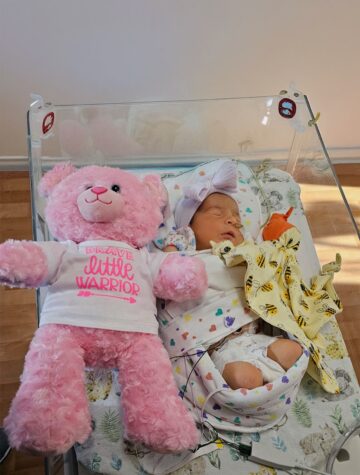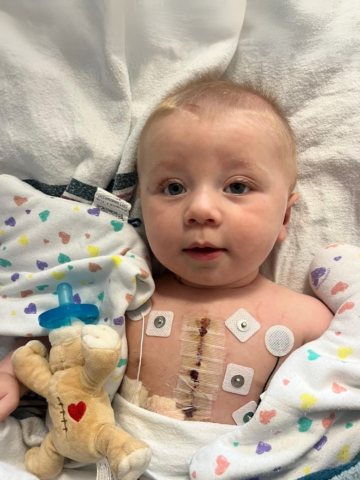Neonatal Intensive Care Units (NICUs) have many machines and monitors for the unique needs of your baby. Here are some of the equipment alarms that you may see or hear in the NICU:
Heart or Cardiorespiratory Monitor
This shows a baby’s heartbeat and breathing patterns. Wires from the monitor are attached to sticky patches called leads. These leads are placed on the baby’s chest and stomach. This monitor will beep if the heart rate or breathing rate is high or low.
Normal heart rate is 120-160 beats per minute. Heart rate varies with age and can change with the baby’s activity (crying, eating, etc.). It is common for the heart rate to be irregular for short periods of time.
Normal breathing rate is 40-60 breaths per minute. Babies that are born early can have short pauses in their breathing, this is called periodic breathing. These pauses can be longer than 20 seconds, this is called apnea. Rubbing your baby’s back will help stimulate the baby to breathe.
This monitor may also beep if any of the leads have fallen off or need to be moved to a different spot.
Pulse Oximeter
This measures the amount of oxygen in your baby’s blood. A tiny red light is taped to the baby’s foot or hand. A wire connects the light to the monitor. Oxygen levels depend on your baby’s age and their diagnosis. Normal oxygen levels for a baby born on time are 90-100%. Smaller babies who are born earlier and weigh less may have lower oxygen levels from 85-92%. A baby who has something wrong with their heart could also have a low oxygen level. For babies with a heart disease, the oxygen level is based on their specific heart problem.
We respond to oxygen alarms for premature babies differently than we do for full term babies. Our goal is to decrease the risk of eye damage from oxygen use, so the response to a low oxygen level may not always be to give the baby oxygen. We monitor your babies oxygen levels carefully to be sure that the baby gets just as much oxygen as they need.
You may hear this alarm often due to your baby wiggling, not because of a low oxygen level.
Respirator or Mechanical Ventilator
This machine helps babies who cannot breathe on their own or who need help taking bigger breaths. Ventilators can also deliver extra oxygen to the baby and provide pressure to help keep a baby’s airway open. Alarms on the ventilator may beep if your baby is upset and breathing too fast, or if your baby needs suctioning
Transcutaneous Oxygen/Carbon Dioxide Monitor (TCOM)
This machine measures oxygen and carbon dioxide levels. A small circular pad is taped to your baby’s skin. A wire connects the pad to the monitor. This alarm will beep when the levels are reading too high or low. This alarm may also beep when the circular pad on the baby needs to be moved or replaced. When this monitor is used we can draw less blood from your baby.
Isolette/Warmer
A temperature probe is placed on the baby’s skin with a sticky heart shaped patch. A wire connects the temperature probe to the warmer or isolette to monitor your baby’s temperature and to help keep the baby warm. The isolette/warmer will beep if your baby is starting to get cold or too warm. It may also beep if the probe needs to be moved to a different spot.
IV Pumps
Many babies in the NICU need fluids and electrolytes through an IV. An IV is a small tube that sits in a vein. The IV pumps will beep when medications are almost finished or complete. You will hear these alarms often in the unit.
Feeding Pumps
Premature babies, especially those younger than 32-34 weeks gestation, usually cannot be fed from the breast or bottle. Tube feedings may be needed until your baby learns to suck strong enough on their own. Feeding pumps will alarm when feedings are done or if the tubing becomes blocked.
Key Points:
- Monitors and machines in the NICU have alarms that let the medical team know when something needs to be checked.
- Most of these alarms are set to go off well before a situation becomes serious, so even though you see nurses responding, it may not be an emergency.
- Please understand that many of the alarms are “false” alarms or not serious.
- The most important thing you can do is ask your NICU staff what the equipment is and what the alarms mean. Understanding goes a long way towards making your stay in the NICU more comfortable.




